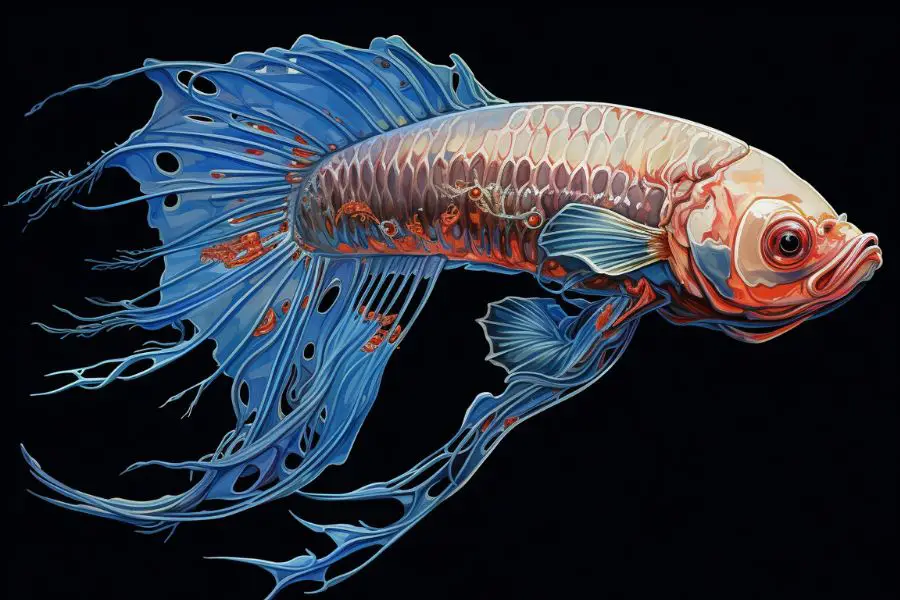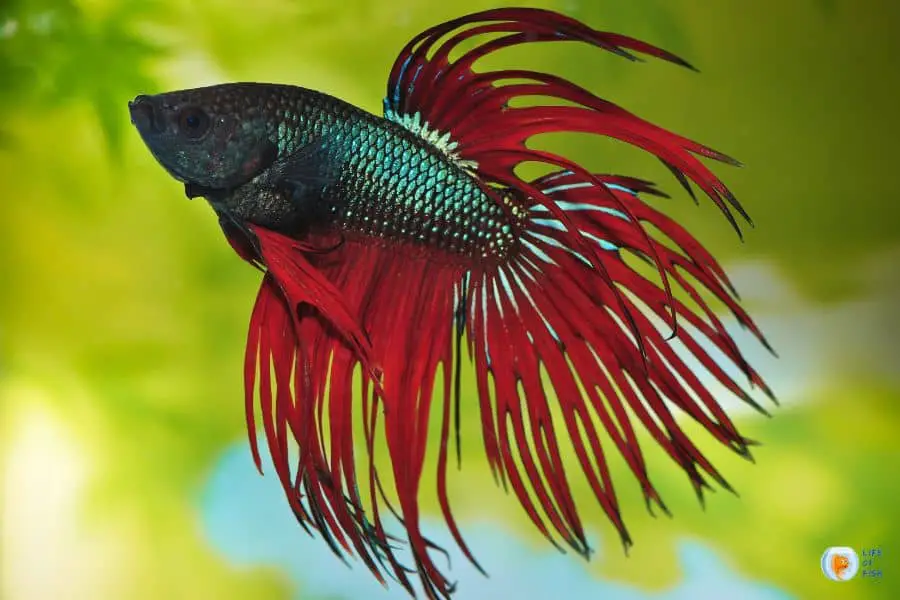The brilliantly colored betta fish is one of the most popular freshwater pets. Their flowing fins and feisty personalities captivate aquarists. However, the beauty of these fish comes with special care requirements.

One common problem is underweight bettas, with their spine and ribs visibly protruding through sunken sides. Fixing the underlying issues and nursing these skinny fish back to full figures takes patience and diligence.
Signs of an Underweight Bettas
Jump To
Because bettas have compact, sleek bodies, assessing their weight by sight alone can be tricky. However, clear hallmarks of an undernourished betta include:
- Sunken belly below the head and pectoral fins
- Prominent spine and rib bones visible through the skin
- Loss of fullness around the face and eyes
- Listless lethargy and loss of appetite
- Fading, washed-out coloration
Bettas should display smooth, gently rounded contours from head to tail. The outline of the spine and ribs shouldn’t be evident. While fatty bloating is also unhealthy, a streamlined yet filled out body shape is ideal.
Health Dangers of Underweight Bettas
Being too skinny compromises a betta’s health and reduces its lifespan. Undernourishment impairs their organ function and weakens their immune systems. The impacts also raise the risk of additional problems like:
- Increased susceptibility to disease
- Fin rot due to weakened tissue
- Organ failure
- Compromised swimming ability
- Lethargy and depression
- Reduced growth and maturation
Getting bettas back up to weight is crucial both for reversing these effects and avoiding new issues. Timely intervention and dedicated nursing care leads to the best recovery outlooks.
Common Causes of Weight Loss in Bettas
Bettas can lose weight for many reasons, ranging from husbandry mistakes to underlying illnesses. Determining the root cause is key for proper treatment. Common causes include:
Insufficient Diet
Too little high-quality food starves bettas of proper nutrients. Feeding low-grade diets, improper amounts, or not enough variety can all cause declines.
Housing Issues
Unsuitable water conditions like low temperature, dirty water, or small tanks stress bettas. Exposure to toxins or unsuitable pH also tax their health.
Illness
Diseases like parasites, infections, or cancers increase caloric needs while decreasing appetite. Tuberculosis and kidney disease are common weight-loss culprits.
Old Age
Aging bettas lose muscle mass and experience weakened digestion. Adjusting diet and tank setup becomes imperative as they decline.
Stress
Chronic stressors such as bullying tankmates, loud environments, or frequent handling sap body weight over time. Bettas need low-stimulation housing.
Identifying whether insufficient nutrition, illness, stress, or a combination is to blame determines how to nurse the fish back to full weight and vigor.

Dietary Improvements for Underweight Bettas
Balancing protein, fats, and nutrients tailored to bettas’ carnivorous needs is essential for regaining weight. Key diet tips include:
- Feed high-protein foods like bloodworms, brine shrimp, and quality pellets
- Offer freeze-dried treats to entice appetite and provide calories
- Soak pellets before feeding to prevent bloating
- Give smaller portions 2-4 times daily rather than one large meal
- Supplement with infusoria, micro worms, or powdered fry foods
- Avoid filler-packed flake foods low in nutrition
- Monitor eating and adjust diet as needed
Home-culturing live foods like daphnia, vinegar eels, or microworms provides natural variety filled with proteins and fats. Varying diet improves nutrition and encourages picky eaters.
Creating a Recovery Environment
Housing bettas in an optimal environment lowers stress and supports healing. Important factors to address include:
- Warm, stable temperature between 78-82°F
- Low water flow with gentle filtration
- Places to hide and rest near the surface
- Clean, cycled water changed twice weekly
- Tank size over 2.5 gallons minimum
- Soft, fine-grain substrate and decor
- Low aquarium traffic and activity
- Natural daylight cycles with room darkening at night
Minimizing environmental disruptions while eliminating toxins and bacteria supports the immune system. Bettas conserve energy normally spent on stress reactions and healing happens faster.
Medical Care Options
Medications and direct treatments boost recovery, especially for illness-related weight loss. Under a vet’s guidance, options to discuss include:
- Antibiotics or antifungals to clear stubborn infections
- De-worming medications to eliminate parasites
- Anti-inflammatory meds to improve digestion
- Vitamin supplements added directly to the water
- Appetite stimulant medications to encourage eating
- Temporary immersion in a hospital tank for intensive care
- Gentle daily massage to stimulate circulation
Avoid overusing medications, which can further stress bettas. Work closely with an exotic animal veterinarian for the most effective medical weight restoration plan.
Long-Term Weight Maintenance
Once a betta regains normal weight, continued care is vital to prevent backsliding. Steps to maintain healthy weight long-term include:
- Ongoing varied diet of high-protein foods
- Adjusting feeding amounts as the fish ages
- Continued lab work to monitor for illness
- Holding to a consistent tank cleaning routine
- Testing water parameters weekly
- Adding supplements or medications at the first signs of relapse
- Keeping a backup hospital tank for quick intervention
- Monitoring for recurring signs of parasite infestation
- Reducing handling to lower stress
While frustrating, skinny bettas can fully recover with dedicated nursing care over time. Paying close attention to their environment, nutrition, and health allows their true colors and spirits to shine through again. With some patience and adjustments, bettas can thrive for years at their proper Weights.
Read More:
Ember Tetras with Betta Fish : The Complete Guide to Housing
Compatibility Guide: Keeping Neon Tetras with Betta Fish
